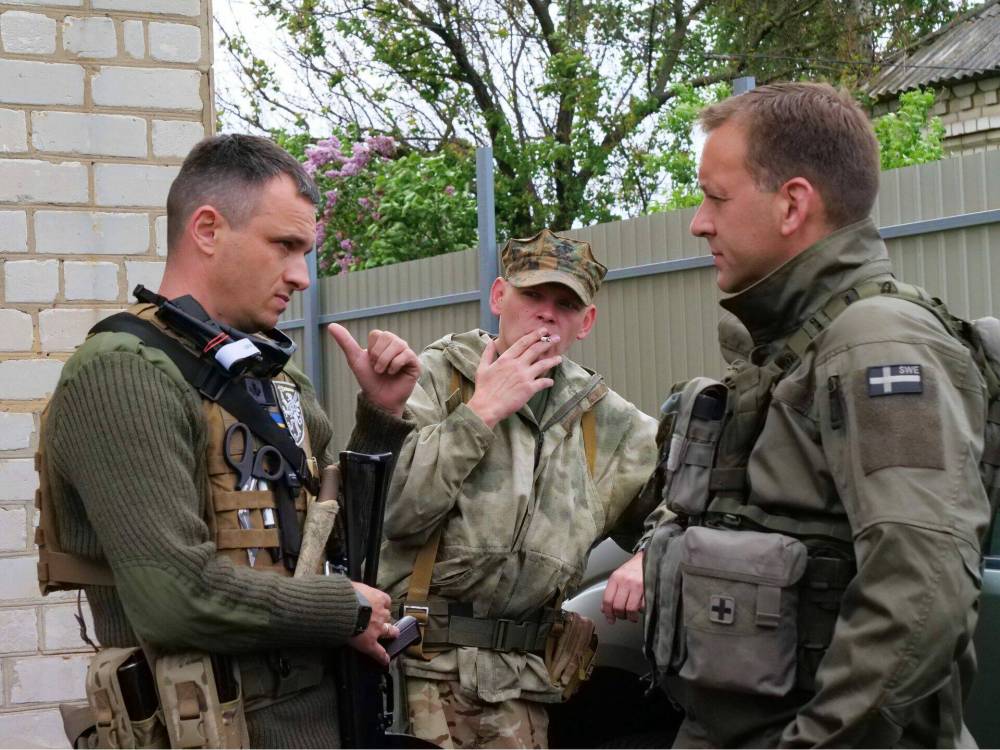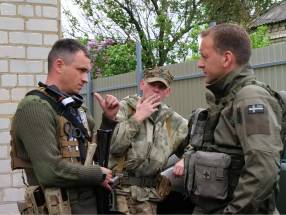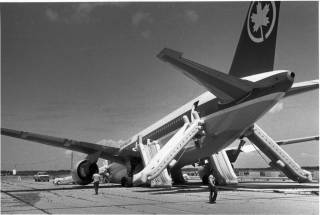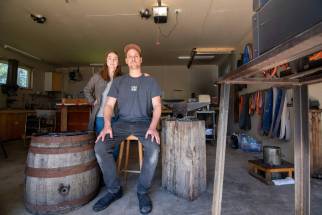Fortifying the fight Ukrainian expats, foreigners step up efforts to equip country’s burgeoning military
Read this article for free:
or
Already have an account? Log in here »
To continue reading, please subscribe:
Monthly Digital Subscription
$1 per week for 24 weeks*
- Enjoy unlimited reading on winnipegfreepress.com
- Read the E-Edition, our digital replica newspaper
- Access News Break, our award-winning app
- Play interactive puzzles
*Billed as $4.00 plus GST every four weeks. After 24 weeks, price increases to the regular rate of $19.95 plus GST every four weeks. Offer available to new and qualified returning subscribers only. Cancel any time.
Monthly Digital Subscription
$4.99/week*
- Enjoy unlimited reading on winnipegfreepress.com
- Read the E-Edition, our digital replica newspaper
- Access News Break, our award-winning app
- Play interactive puzzles
*Billed as $19.95 plus GST every four weeks. Cancel any time.
To continue reading, please subscribe:
Add Free Press access to your Brandon Sun subscription for only an additional
$1 for the first 4 weeks*
*Your next subscription payment will increase by $1.00 and you will be charged $16.99 plus GST for four weeks. After four weeks, your payment will increase to $23.99 plus GST every four weeks.
Read unlimited articles for free today:
or
Already have an account? Log in here »
Hey there, time traveller!
This article was published 03/06/2022 (1371 days ago), so information in it may no longer be current.
LVIV — Jonas von Matern pops the tailgate on the camouflage green Nissan Navara to reveal the goods he’s packed up and hauled across the European continent to Ukraine. It’s standard fare: 200 litres of fuel, tactical night-vision equipment, 300 tourniquets, bulletproof armour plates, camouflage netting and a smattering of other things to fill the truck bed.
WAR IN UKRAINE
Freelance Winnipeg writer Sarah Lawrynuik travelled to Ukraine in May to cover the ongoing conflict. She is a second-generation Ukrainian-Canadian. In this story, she travelled across Ukraine with foreign nationals from Lviv to Kramatorsk as they delivered critically needed military aid to front-line units.
It’s standard fare for him, as this is von Matern’s sixth trip to the country in the past three months, delivering seven vehicles — with help from a co-pilot — and similar hauls of defensive military aid equipment. Von Matern, who resides in Stockholm, was immediately drawn to help in a war that feels as if it’s on his own doorstep, but he wasn’t originally sure how he could be of most use.
“Back home, I’m a helicopter pilot, so the first thing that came to my mind was thinking they might need help with pilots for evacuation or transports or whatever. But I couldn’t get in contact with anyone that could give me an answer,” von Matern recalled.
To try and get more information, he decided to travel to Ukraine. But not wanting to show up empty handed, he fundraised and brought over the first of the seven vehicles loaded with goods.
“Back home, I’m a helicopter pilot, so the first thing that came to my mind was thinking they might need help with pilots for evacuation or transports or whatever.” – Jonas von Matern
“I managed to find one person who gave me most of the funds that I needed for the truck. And then a lot of other people helped me with the small stuff,” he said.
Following his initial incursion, von Matern realized delivering protective, medical and tactical gear to the growing military — as well as four-wheel drive vehicles — might be the best way he could contribute to the war effort.
The Ukrainian army had transformed nearly overnight from a contracted fighting force of slightly more than 200,000 people, to a force that is — at the conservative end of estimates — now more than double that size. (Generous estimates from soldiers on the ground say the force has grown to a million people.)
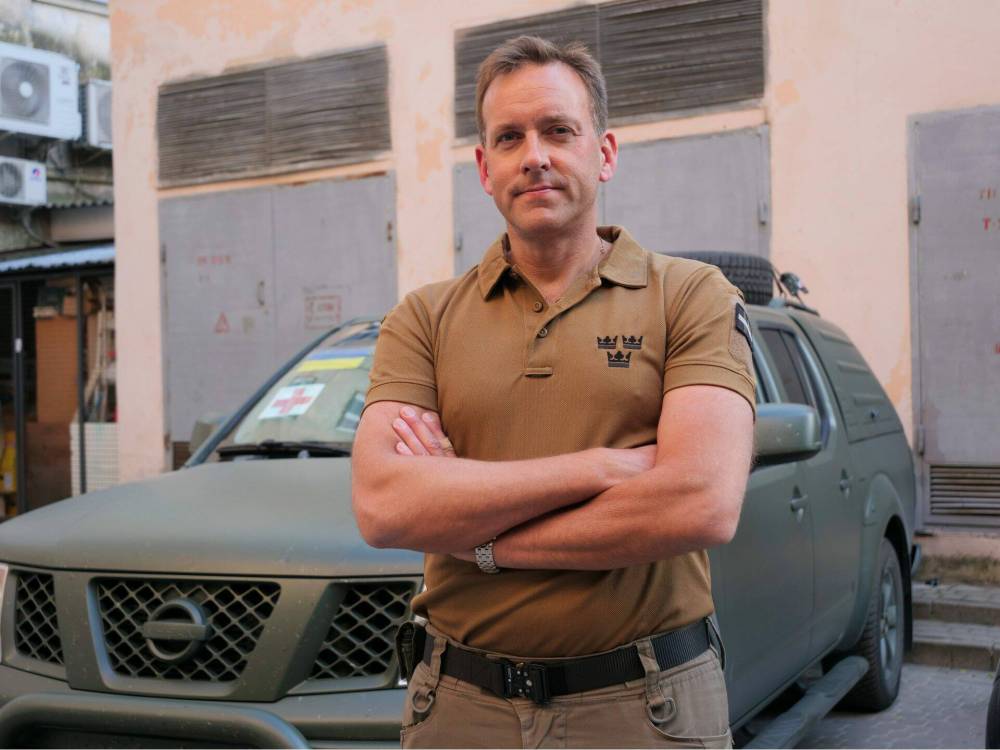
But this has left many Ukrainian soldiers and military units at varying levels of preparedness when it comes to equipment. Von Matern saw an opportunity to help shepherd in needed items independently, with his Swedish passport becoming his most valued possession since fighting-aged Ukrainian men aren’t able to leave the country right now.
“The way I look at it, the only way to shorten suffering for civilians is not by helping the Red Cross or Doctors Without Borders, because that will not shorten the war. Helping the Ukrainian military will hopefully shorten the war by making them win faster. So if you give them the equipment they need to fight the Russians, we can end the war and the suffering for civilians,” von Matern said.
Von Matern is just one of an ad hoc international force of volunteers who have popped up over the past few months transporting similar deliveries to the Ukrainian military as it struggles with the force’s growing pains and supply chain constraints.
When Vartan Davtian left his Brandon home in March for Ukraine, he wasn’t sure exactly how he would be helping, he just knew he needed to go. The Manitoban was born in Armenia but raised in Ukraine and still has family there.
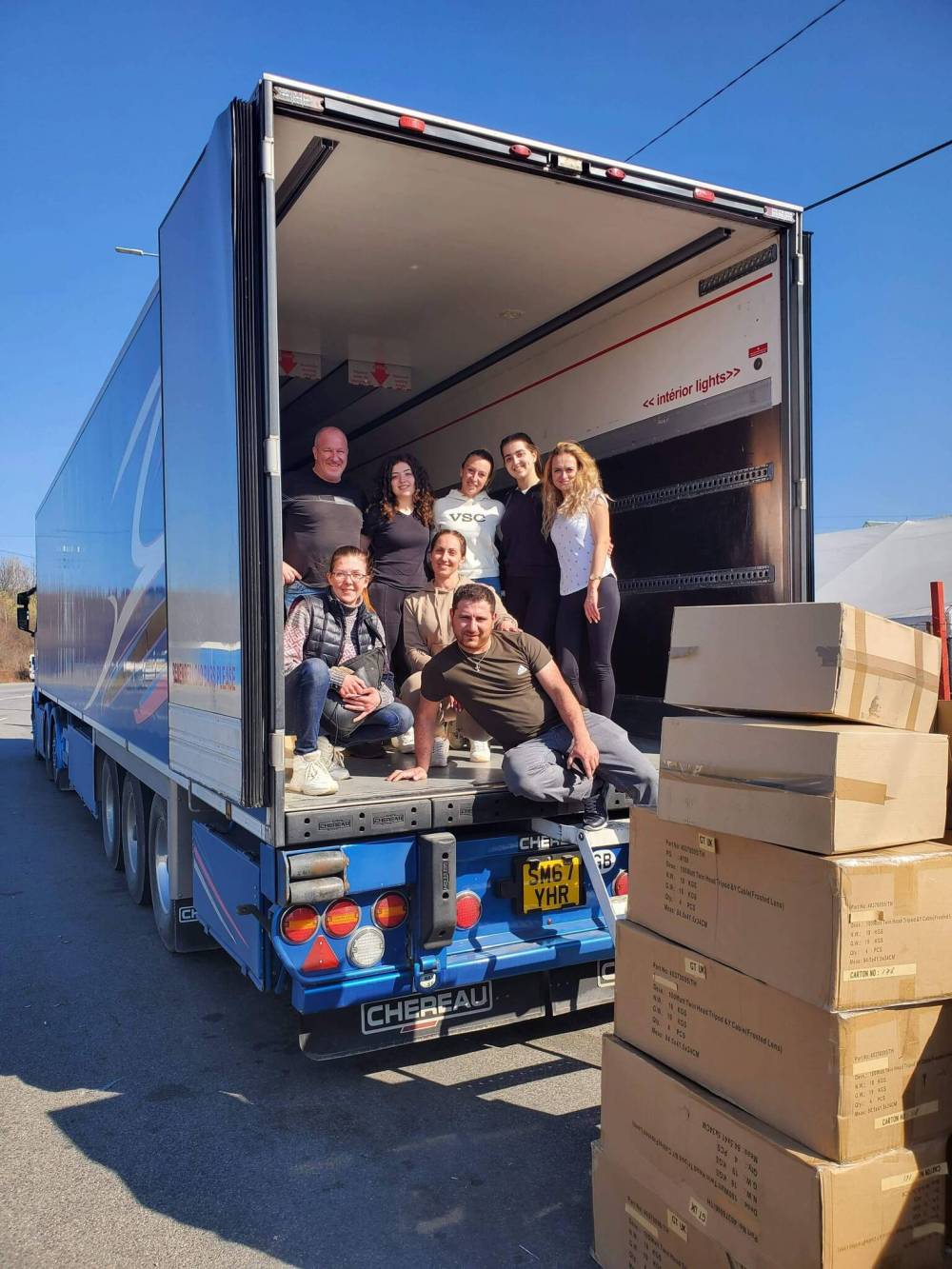
“When I arrived, it was chaotic, it was pretty much crazy. Like people with kids and luggage and just walking through the border, just leaving the country. There was people who got bombed in their apartments and stuff and they on the border with kids. It was a nightmare watching all this stuff,” he said.
After getting into Ukraine, he began building a network of connections in the western city of Lviv. He recognized the same need von Matern witnessed and has since been doing similar work. Most recently Davtian delivered a number of vehicles purchased in Germany, and he has been ferrying supplies from Kyiv to the eastern provinces where intense fighting is ongoing.
For Davtian, focusing his help on the military was a more personal choice.
“Like all my (childhood) friends are fighting. So that’s the reason I came, because I couldn’t stay in Canada while my friends are here risking their lives,” he said.
“Like all my (childhood) friends are fighting. So that’s the reason I came, because I couldn’t stay in Canada while my friends are here risking their lives.” – Vartan Davtian
Ukrainian government officials have said in recent weeks that, in addition to supply chain constraints, military goods intended for the front lines are instead landing on the black market. It’s a big part of what motivated von Matern not to simply leave goods inside Ukraine’s western border, but deliver it all of the way to the front-line units with which he’s connected.
After traversing almost 900 kilometres into the country, von Matern arrives in the central-southern city of Kryvyi Rih, where he drops the tailgate on the Nissan Navara again, this time to show the equipment to Ivan, his contact in a front-line medical unit. He shows him how the night-vision gear works, and they discuss where the equipment should be directed.
Together they study Google maps and Ivan outlines the routes to take into the eastern city of Bakhmut, which has come under more intense Russian fire in recent days. There, von Matern is to meet with an intelligence unit to drop off some of the tactical gear he is transporting.
“Take this way,” Ivan says while tracing a road on the map. Moving his finger to a more southern route, he says, “This other road is no good. It’s got Russians.”
“So make sure you go this way,” he emphasizes again.
But meeting with the intelligence unit is a job for the next day. First, Ivan shows on the map the location of the rest of his medic unit who have set up camp outside the city of Kramatorsk. Here, von Matern can spend the night; it will also be where he drops off the truck and medical supplies.
After several more hours on the road, von Matern is received with a warm welcome into a family home that’s been abandoned, and re-inhabited by a group of soldiers, most of whom belong to a medic unit. It’s this team that will use the truck. The soldiers show von Matern where he can sleep and they chat over dinner.
“We started hearing about how some of the equipment was not working how it was supposed to,” said Lt. Roman Hasko. “So we tested it ourselves.”
Hasko explains that they put two supposedly bulletproof plates to the test using their AK-74 assault rifles. One plate blocked a bullet, the second one didn’t.
“The other plate, the bullet just went right through,” Hasko explained.
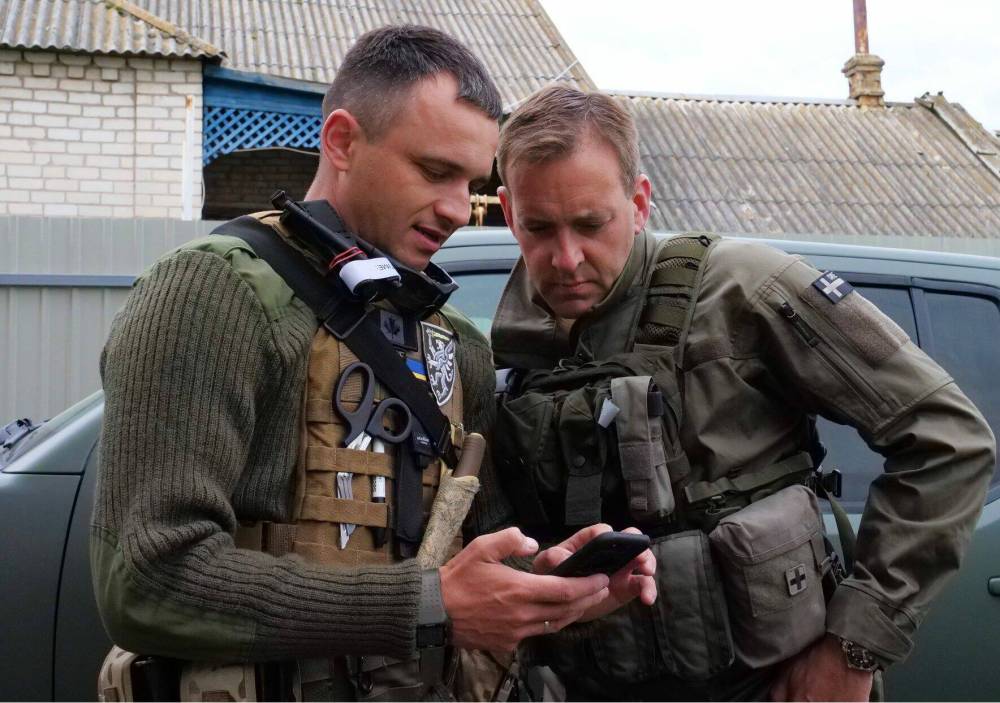
Counterfeit military equipment has been an issue as the country has been in dire need of goods. Ballistic armour and tourniquets that break when applied have primarily been of concern. This week the Ukrainian government released estimated casualty counts for its military, saying that between 60 and 100 soldiers are dying every day, principally in the eastern region of the Donbas where Hasko and his team are working. It’s estimated another 500 soldiers are injured every 24 hours.
“We understand that the plates mostly offer psychological protection at this point,” Hasko added.
These encounters only embolden von Matern and others to continue delivering quality equipment to the front line, to the soldiers who are risking their lives to protect Ukraine.
Von Matern takes one set of the ballistic plates he’s brought along and replaces what Hasko has been using in his protective vest. Progress in this battle to arm the ever growing army is slow but rewarding.
“Most military units have helmets and body armour by now,” von Matern said. “But they lack the tactical helmets where they can connect to night vision goggles. They lack the body armour that lets you move around more easily and can be used on reconnaissance missions. That’s the specialized equipment that they are mostly asking for now. Of course, there are still units that have nothing, hardly have a uniform. But the military is going to grow up into a million people, so it’s going to be like this for a while.”
“They (military units) lack the body armour that lets you move around more easily and can be used on reconnaissance missions.” – Jonas von Matern
Hasko points to various pieces of equipment around the house — uniforms, backpacks, vests — that’ve been purchased by the soldiers themselves. Some are even driving their personal vehicles.
“Things are getting better, but at the beginning, they basically gave us a gun and said, ‘Go and fight.’ But what else could they do? The army has grown so fast,” Hasko said.
Delivery of the vehicle and goods is only half the battle. Because flights in Ukraine have been grounded since Feb. 24, von Matern now embarks on his journey home, which involves more than 30 hours on trains before arriving in Warsaw and catching a flight back to Stockholm.
The spirit of defence
When Drew Luhowy left his western Manitoba home in Rossburn on April 1 for Ukraine, he was only expecting to help out for his three weeks of vacation time.
“I guess what brought me here, more or less, is kind of the same story as everyone else who’s here, we just got frustrated and sick of watching. You can certainly look at more nuance and stuff, but it really boils down to something as simple as I just fundamentally don’t believe what is happening here is morally right,” Luhowy said.
When Drew Luhowy left his western Manitoba home in Rossburn on April 1 for Ukraine, he was only expecting to help out for his three weeks of vacation time.
“I guess what brought me here, more or less, is kind of the same story as everyone else who’s here, we just got frustrated and sick of watching. You can certainly look at more nuance and stuff, but it really boils down to something as simple as I just fundamentally don’t believe what is happening here is morally right,” Luhowy said.
Three weeks on the ground was enough time to feel like he understood where and how he could pitch in effectively. He and a few others he met created an organization of drivers and translators to move military and humanitarian aid, which was continuously being held up in Warsaw, Lviv or Kyiv, out towards the eastern provinces. They called it Renegade Relief Runners.
He went home at the end of April, quit his job at John Deere, got his finances in order to see how far he could stretch his savings, and he booked another ticket back to Ukraine.
“So just looking at my savings, to calculate the maximum amount of time I could spend before I absolutely needed to go home and would be getting to a point of bankruptcy. So that roughly falls on July 25. That’s when my ticket is booked. And then I flew back in on May 9 and got my own vehicle. Now my team has a bunch of vehicles and we’ve onboarded a bunch of new volunteers,” Luhowy said.
But over the weeks Luhowy has spent in Ukraine, he’s learned how fluid safety can be.
On his first trip into the country, he had been delivering aid to the eastern industrial city of Kharkiv with minimal trouble. On a recent trip, he saw first hand how the battle on the eastern front is heating up again and becoming more unpredictable.
A rocket attack struck inner-city Kharkiv less than a block from where they stood.
“I just remember looking up over the van because I was collecting a bag over the side. Things were normal. And then bang. And the ground shook, there was smoke. It was just like if you shut your eyes, then you open them and it’s like a before and after picture.”
A video posted to Twitter by a journalist from Las Vegas shows Luhowy and his team members performing emergency first aid on civilians that were hit by shrapnel. Everyone from his team is safe, but they are still waiting to hear about the condition of the civilians who were transported to a local hospital.
Despite the security risks, Luhowy is determined to keep delivering aid to communities until he can’t afford to anymore.
“The honest answer is that nothing’s changed. If anything, the desire to help is increased,” Luhowy said. “I’m just keeping a really cognizant and close watch on my mental health and mental state right now because I’m strangely calm. And like I said, I’m very proud of the work we did.”
— Sarah Lawrynuik
Throughout Ukraine, unofficial support networks are developing to help this ad hoc chain of military aid delivery drivers.
Peter Chernyshov, a Ukrainian businessman and former CEO of Ukrainian telecom Kyivstar, got his family out of the country months ago, and consequently has been able to offer vacant places for von Matern and others to stay — apartments now operating as dorms for the weary travellers.
“I guess I am doing this. But I’m doing many other things. So sure, my friends are staying (in my home). Some refugees who are moving to Scotland will also stay here on their way to safety,” Chernyshov said. “You may have noticed that this war is a great national war. Everybody who is over 15 years is doing something in the war effort. You don’t have anybody in this country who is not doing something to win the war.”
“You may have noticed that this war is a great national war. Everybody who is over 15 years is doing something in the war effort.” – Peter Chernyshov
For the foreign nationals who are pitching in however they can, there is no end in sight — at least not for now.
Davtian has no return flight booked to Manitoba. Instead he is continuously working on fundraising efforts, including selling a treasure trove of Ukrainian propaganda swag in North America, where people are willing to pay more for things like pillows adorned with Ukrainian president Volodymr Zelenskyy’s face, magnets with an illustrated Ukrainian soldier giving the middle finger to the Russian warship Moskva.
“Honestly, I don’t know. I’m not planning anything, so long as my phone is ringing. I’ll be here,” Davtian said.
As von Matern sits on the train headed out of Ukraine, his phone rings and another military unit is pleading their case for why he should bring them equipment on his next trip. This time, the need is helmets for a unit headed to the front line in the Luhansk region.
“When I keep getting phone calls like that, how can I take a break?”

His fundraising efforts will continue on his Facebook page and his next trip is already booked.
“I’m hoping the war won’t go on too long,” von Matern said. “But I don’t see any point at which I’ll make the decision that, ‘Yeah, this is enough. I’ve helped enough now.’ How can I just go home and watch TV? You can’t really just go back home and forget what you’ve seen and been through here with people who have showed such gratitude and gratefulness.”
— Special to the Free Press
sarah.lawrynuik@gmail.com
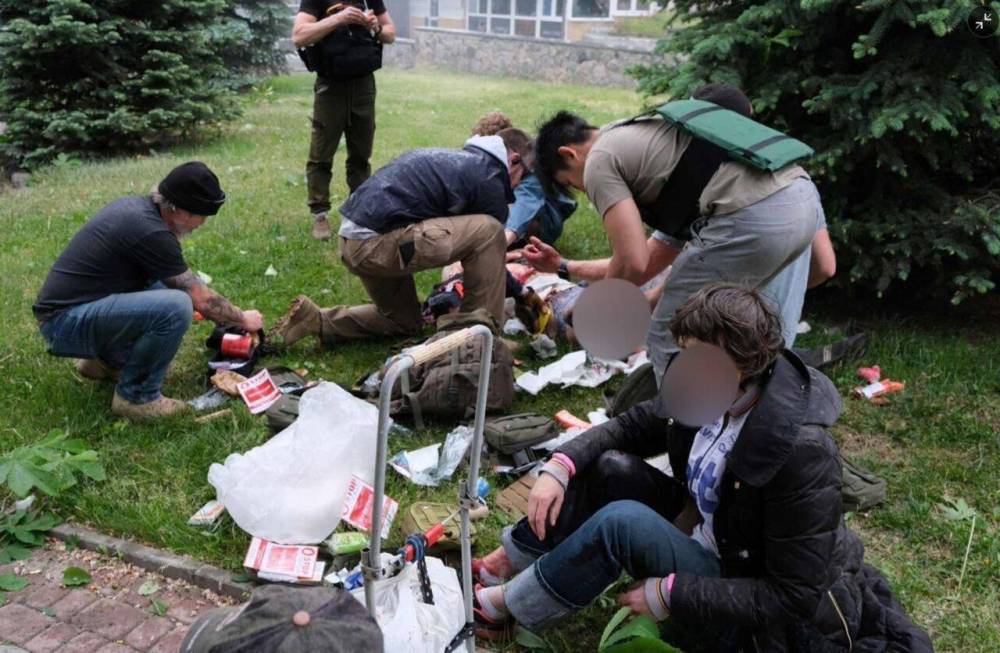
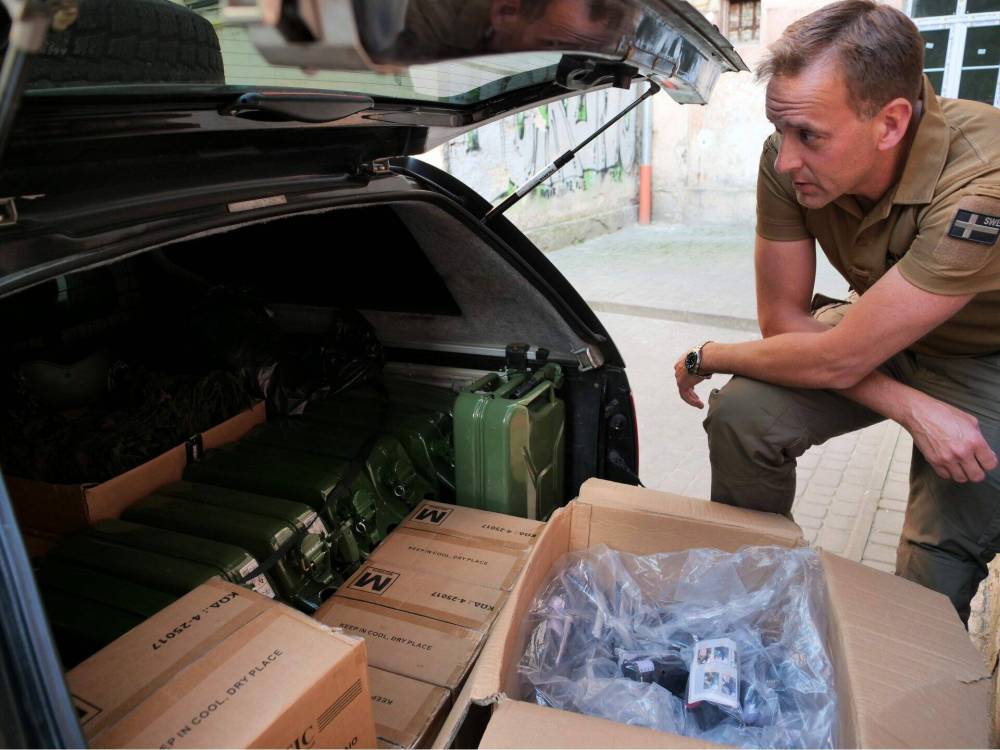
History
Updated on Friday, June 3, 2022 10:24 PM CDT: Corrects spelling of expats

